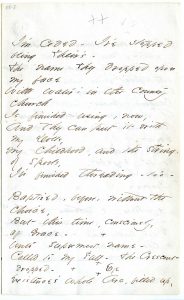 I’m ceded – I’ve stopped
I’m ceded – I’ve stopped
being Their’s –
The name They dropped opon
my face
With water, in the country
church
Is finished using, now,
And They can put it with
my Dolls,
My childhood, and the string
of spools,
I’ve finished threading – too
 Baptized, before, without the
Baptized, before, without the
choice,
But this time, consciously,
Of Grace –
Unto supremest +name –
Called to my Full – The Crescent
dropped –
Existence’s +whole +Arc, filled up,
With +one – small Diadem –
My second Rank – too small
the first –
Crowned – +Crowing – on my
Father’s breast –
+A +half unconscious Queen
But this time – Adequate –
Erect,
With + Will to choose,
Or to reject,
And I choose, just a
+Crown –
name] +term
whole are] + Surmise Arc] +Rim • Eye
one] +just one
Crowing] +whimpering • dangling
half unconscious] +too unconscious A half unconscious Queen] +An insufficient Queen
Will] +power Crown] +Throne
Link to EDA manuscript. Originally in Amherst Manuscript #fascicle 85. First published in Poems (1890), 60-61, with the last stanza in six lines and the alternative for line 20 adopted. Courtesy of Amherst College, Amherst, Mass.
We end the cluster with this ringing acclamation of independence and self-naming. Unlike other poems in this group, notably “Title divine,” with which we began, “I’m ceded–“ is less ambivalent or ambiguous. While the notion of being “ceded” implies being owned and then yielded or surrendered to another power, it also connotes being freed and liberated. The passivity and childishness of being named by others turns into a “conscious” or “half unconscious” (which implies half-conscious) acceptance and embrace of “Grace,” which for Congregationalists was a state requiring receptivity that could only be conferred by God. In the second stanza, the speaker rejects her “second rank,” which she depicts as dependence on “my Father,” as “too small,” for a self-conferring of name, title, rank, and royalty.
The poem seems to repeat itself, or repeat the amazing moment of self-realization as if it cannot get enough of it. The first stanza ends with luscious language of fulfillment and a crown, and not a subjunctive tense in sight: “Called to my full … Existence’s whole Arc, filled up, / With one – small Diadem –“ The language of the second stanza is even more insistent, and rather than using imagery of filling up associated with the feminine, it uses imagery of adequacy and erection and willfulness associated with masculinity. Thus, the “half-unconscious Queen” becomes “Adequate–/ Erect,” the trochees hammering home the force of this self-nomination. The speaker has become someone with the power to make choices, not be the chosen one, and again, she chooses “just a/ Crown.” But note that each reference to a crown contains a tiny qualification, “small Diadem” and “just a /Crown,” perhaps to guard against hubris?
Sources Back to Poem Index for Feb 12-18 To Week’s Reflection

